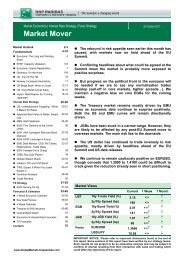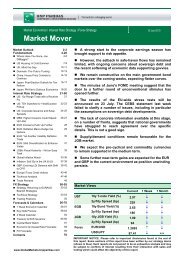Market Economics | Interest Rate Strategy - BNP PARIBAS ...
Market Economics | Interest Rate Strategy - BNP PARIBAS ...
Market Economics | Interest Rate Strategy - BNP PARIBAS ...
You also want an ePaper? Increase the reach of your titles
YUMPU automatically turns print PDFs into web optimized ePapers that Google loves.
Eurozone Periphery: Compare and Contrast<br />
• The Greek crisis is spreading to other socalled<br />
peripheral countries.<br />
Chart 1: 10yr Spreads to Bund<br />
• It is important to highlight significant<br />
differences between these economies.<br />
• These include differences in the size of<br />
deficits & debts, liquidity risks, contingent<br />
liabilities, fiscal credibility and social tolerance.<br />
• But we should also recognise that there are<br />
similarities which make them vulnerable to<br />
further market tensions.<br />
• Portugal shares Greece’s low saving ratio.<br />
• Spain’s problem is an excess of private debt<br />
with possible fallout on the financial sector.<br />
• Ireland’s fiscal reform to date has been<br />
impressive but sovereign risk is tied up with the<br />
banking system, making the recent widening of<br />
spreads a reason for concern.<br />
• Italy’s imbalances are less worrying than in<br />
other economies, but its high debt-to-GDP ratio<br />
makes it vulnerable to an interest rate shock.<br />
Source: Reuters EcoWin Pro<br />
18<br />
16<br />
14<br />
12<br />
10<br />
8<br />
Chart 2: Age-Related Expenditure<br />
(Change 2010-2060, % of GDP)<br />
6<br />
4<br />
The agreement of eurozone finance ministers over<br />
the weekend to provide EUR 110bn worth of financial<br />
support to Greece has failed in its objective of<br />
calming markets and preventing risk aversion from<br />
increasing. The crisis is now spreading to other socalled<br />
peripheral countries. Portugal is leading the<br />
way but sovereign spreads have significantly<br />
widened in Spain, Ireland and Italy, highlighting the<br />
risks of an indiscriminate contagion effect.<br />
From a macro perspective, it is important to highlight<br />
that these economies are heterogeneous and differ<br />
significantly from Greece. At the same time, they<br />
share a number of structural weaknesses and<br />
imbalances which, in the absence of a prompt and<br />
decisive response from the eurozone authorities,<br />
make them vulnerable to further market tensions.<br />
Greece versus other peripherals<br />
Greece’ situation differs significantly from that of<br />
other peripheral countries on a number of counts:<br />
• First, the level of the public deficit and debt. At<br />
13.6% of GDP in 2009, the Greek public deficit<br />
was second only to Ireland’s (14.3% of GDP).<br />
Greek public debt as a share of GDP (115.1%) is<br />
similar to Italy’s (115.8%) but significantly higher<br />
2<br />
0<br />
Belgium<br />
Germany<br />
Ireland<br />
Greece<br />
Spain<br />
France<br />
Source: EU Commission<br />
Italy<br />
Cyprus<br />
Malta<br />
Netherlands<br />
than those of Portugal (76.8%) and Spain<br />
(53.2%). Ireland’s debt-to-GDP ratio can be<br />
relatively low (64%) or high (around 100%)<br />
depending on whether you choose to include all<br />
its interventions in the banking sector;<br />
• Second, liquidity risk. Greek redemptions this<br />
year are relatively high this year, about twice<br />
those of Spain and Portugal in relation to GDP.<br />
Moreover, Greece’s refunding tends to be heavily<br />
concentrated during certain months of the year –<br />
increasing rollover risk;<br />
• Third, contingent liabilities. In the absence of a<br />
reform of the pension system, age-related<br />
spending would increase by a massive 16% of<br />
GDP in Greece between 2010 and 2060<br />
according to EU Commission estimates (Chart<br />
2). This is about double the estimates for Spain<br />
(8.3% of GDP) and much higher than the<br />
anticipated rises in Portugal and Italy, where past<br />
reforms should bear fruit over the following<br />
years;<br />
Austria<br />
Portugal<br />
Slovenia<br />
Slovakia<br />
Finland<br />
UK<br />
Eurozone<br />
Luigi Speranza / Eoin O’Callaghan 7 May 2010<br />
<strong>Market</strong> Mover<br />
7<br />
www.Global<strong>Market</strong>s.bnpparibas.com
















